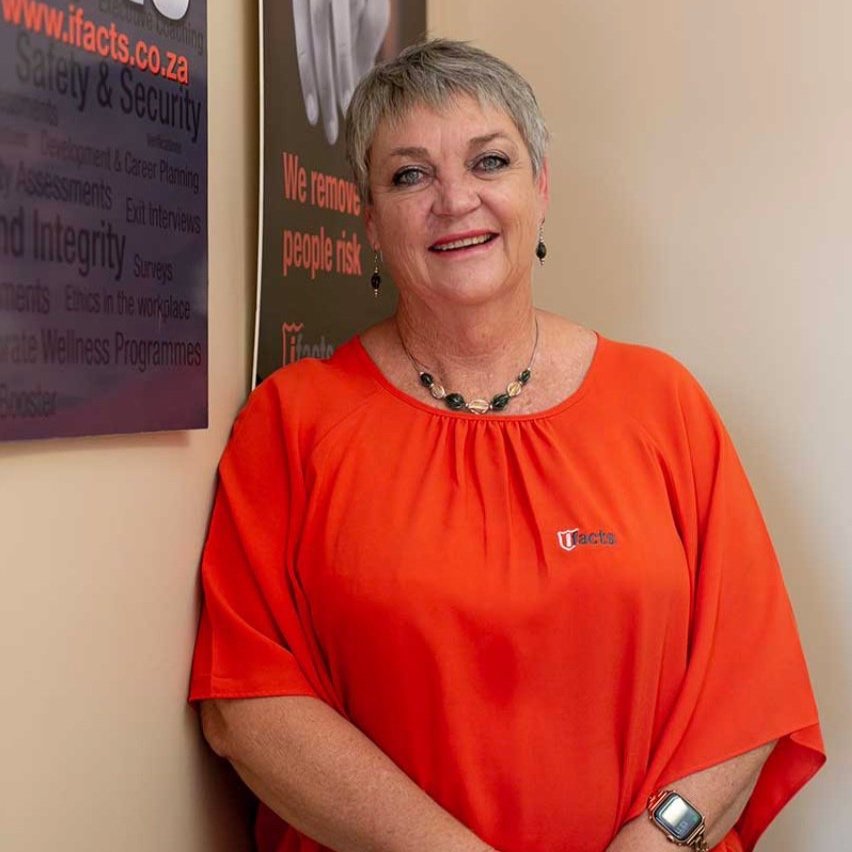JENNY REID
Owner of iFacts
Jenny Reid is a Human Risk Expert and Professional Speaker, and the owner of iFacts based in South Africa, a specialist employee screening and vetting service. She is constantly assessing new and innovative ways to remove the people risk in any organisation. Since 2009 when she took over iFacts completely, she has seen the company double in size and hopes to continue this growth. iFacts specializes in employee Screening, risk assessments, employee wellness, investigations, and truth verification. Jenny is a past President of the Security Association of South Africa.
Contact Jenny via email jenny@ifacts.co.za
www.ifacts.co.za

Read Jenny's Articles
by Jenny Reid
As of the fourth quarter of 2024, South Africa’s official unemployment stats, state that the unemployment rate has declined slightly to 31.9%, down from 32.1% the previous quarter. While this marks the second consecutive quarterly decrease and the lowest rate since the third quarter of 2023, the persistently high levels of unemployment remain a pressing concern.
by Jenny Reid
As of the fourth quarter of 2024, South Africa’s official unemployment stats, state that the unemployment rate has declined slightly to 31.9%, down from 32.1% the previous quarter. While this marks the second consecutive quarterly decrease and the lowest rate since the third quarter of 2023, the persistently high levels of unemployment remain a pressing concern.
by Jenny Reid
In today's digital age, where personal security and privacy are more critical than ever, safeguarding your identity extends beyond online practices. In South Africa, the contents of your rubbish bin can easily become a source of vulnerability, exposing sensitive information to identity thieves without you ever realising it.
by Jenny Reid
In today's competitive job market, having the right tools for employee screening is essential. One tool gaining popularity in South Africa is the integrity test offered by iFacts, the official provider of these assessments from INTEG. These tests focus on reliability, validity, and fairness, ensuring organisations can effectively evaluate potential employees.
by Jenny Reid
World Backup Day, observed on the 31st of March, reminded businesses globally, to protect their data from theft, loss or corruption and focuses on how essential it is that data protections are as comprehensive as possible.
by Jenny Reid
As cybercrime continues to surge in South Africa, the importance of effective employee screening to address this risk is paramount.
In 2024 alone, Interpol reported over 3,300 global cybercrime incidents affecting governments, banks, and the general public each week, reflecting a growing threat landscape. With cyber threats increasingly targeting organisations across South Africa, businesses must prioritise comprehensive screening processes to safeguard against potential breaches stemming from internal and external sources.
by Jenny Reid
Queue of thousands shows desperation at South Africa job crisis. What does desperation cost our country? Many in our country are really struggling but desperate times create desperate measures. Don’t skip your processes in place to address risk. Regardless of how desperate a person may be, make sure you verify details on the job application thoroughly. Every time.
by Jenny Reid
South Africa is grappling with a significant surge in white-collar crime, underscoring the urgent need for robust employee screening practices. The recently released second-quarter crime statistics for July to September 2024 revealed an 18.5% spike in commercial crime incidents compared to the same period in 2023. This alarming increase, from 30,630 to 36,300 cases, highlights the highest surge recorded this year.
by Jenny Reid
In today’s evolving job market, a university degree is no longer the only pathway to success in South Africa. Increasingly, employers are valuing practical skills and hands-on expertise over formal qualifications, opening doors for job seekers who may not have had the opportunity to pursue traditional higher education.
by Jenny Reid
In today’s competitive job market, where talent is often scarce and companies must act quickly to secure top candidates, the candidate experience during the hiring process has become a crucial element in the overall success of recruitment strategies.
by Jenny Reid
The latest Employers Background Screening Report sheds light on the rising challenges and trends in employee screening internationally. With the influx of fraudulent activities and integrity-related challenges, employers are placing greater emphasis on robust verification measures.
by Jenny Reid
The holiday season is coming up and it’s time to start thinking about house sitters and pet sitters. These people will have unsupervised access to your home and your pets for the duration of your holiday. Many things could happen in a couple of days you’re away.
by Jenny Reid
Holiday rental time is rife with scammers, fraudsters and the possibility of theft or damage. For holiday-makers, late bookings run the risk of their deposits being stolen, booking a rental that has already been booked or simply doesn’t exist. There may also be unforeseen fees that get included at the last minute.
by Jenny Reid
The Festive Season is coming up and it’s time to consider the casual staff you intend to hire for the holiday rush. Casual staff are a necessity to help when business picks up in various seasonal industries. However, like full-time staff members, casual staff also need to be screened and vetted prior to employment, even in a short-term capacity.
by Jenny Reid
Many companies have effective pre-employment screening policies, but the need for screening doesn’t end after hiring. Regular rescreening of existing employees at all levels is essential to protect the company from unforeseen issues and to ensure preparedness.
by Jenny Reid
Earlier this year, on 6 May, we all listened in horror as radio stations across the country let us know about a building that had collapsed and 81 people were stuck in the rubble. Awful updates were constantly received with people being unaccounted for, being rushed to hospital in severe condition, or dying. There were allegations that the owner of the building wished to add a storey to the building that the foundations were not built for and that the construction crew allowed and encouraged the cleaning ladies to mix cement for use in the multi-storey building.
by Jenny Reid
Employee fraud, previously called Insider fraud refers to when an employee of your company lies or steals from the company, this could refer to stealing money, maliciously taking access to company assets, or even workplace recognition. Any kind of fraud can negatively affect a company, but employee fraud is becoming a bigger concern than it has been in the past.
by Jenny Reid
In a recent article, there was much controversy about a politician who had been writing Doctor before his name for many years. On further investigation, he was a “doctor in the ministry of counselling” from Trinity International University, Ghana’s campus in South Africa in 2008. “Trinity is not accredited by the South African Qualifications Authority, the National Qualifications Framework, or the Council on Higher Education for Higher Education Qualifications. Trinity is also not accredited by the Ghana Tertiary Education Committee, although the ‘university’ operates out of Ghana.” Due to the institutions’ lack of accreditation or importance outside of a church, South Africans thought that this “Doctorate” should not count. Nor should this politician refer to himself as a doctor. This poses the question, how relevant is a qualification if it does not bring the required skill set to the party?
by Jenny Reid
Employee Screening is an ever-evolving process, no employee screening policy should be cast in stone and remain that way long term. This process should be regularly reviewed and updated to evolve as the human risk factor evolves.
by Jenny Reid
We are often asked for real-time information when conducting background checks for clients, but with the rise of Artificial Intelligence and new global legislation pertaining to this, it is essential that companies understand the risks they face with this information.
by Jenny Reid
Ensuring your new hires and current employees have the skills needed to perform their jobs should be an essential part of pre-employment screening. A candidate submits a CV that outlines the skills they have that are relevant to the position in question, but it’s very easy to lie with skills falsified on a CV.
by Jenny Reid
The AI Act is a European regulation on artificial intelligence (AI)—the first comprehensive regulation of AI by a significant regulator anywhere. The Act assigns AI applications to three risk categories.
by Jenny Reid
CV Reference Checks are a valuable part of the pre-employment screening process as these days, it is incredibly simple to falsify prior employment, references, and education. A CV reference check verifies all the information provided by a candidate in their CV and either confirms the information is factual or proves that the information is false or exaggerated.
by Jenny Reid
Criminal record checks are one of the world’s leading forms of pre-employment checks. Should you be able to deny a candidate employment based purely on their criminal record check?
by Jenny Reid
Often you will hear employers in South Africa complaining bitterly about the complex regulatory landscape that they have to operate in. This now includes the Financial Intelligence Centre Act (FICA). While FICA primarily focuses on combating money laundering and financing terrorism, its impact extends beyond financial institutions to encompass various sectors, including many other businesses and employers. Ignoring FICA requirements can have significant consequences and it is now essential for employers to understand and comply with FICA regulations.
by Jenny Reid
In South Africa, PEP (Politically Exposed Person) and sanctions tests are typically used by financial institutions and certain designated non-financial businesses and professions to comply with anti-money laundering and counter-terrorist financing regulations.
by Jenny Reid
With unemployment rates continuing to escalate and the cost-of-living soaring people are increasingly desperate to find work and will stop at nothing to get their job application to the top of the pile.
by Jenny Reid
A “job” is defined as “a piece of work, especially a specific task done as part of the routine of one's occupation or for an agreed price”. A “skill” is defined “as the ability, coming from one's knowledge, practice, aptitude, etc.” Work has traditionally been focused on jobs, completing the tasks required to fulfil a certain job description. However, Deloitte, suggests instead of looking at work as a series of jobs, we should be focused more on the set of skills held by employees and how those benefit the company as a whole.
by Jenny Reid
As we approach December in Southern Africa, we are reminded of the vast difference in how annual holidays are celebrated in the different hemispheres of the world. Here in South Africa, we are preparing for our “long” annual holiday and much celebration over Christmas.































The 2025 World Economic Forum (WEF) Risks Report has ranked misinformation and disinformation as one of the top global threats, highlighting a challenge beyond social media and politics. This alarming ranking underscores how false or misleading information—whether accidental or deliberate—can destabilise societies, erode trust, and threaten organisational resilience.